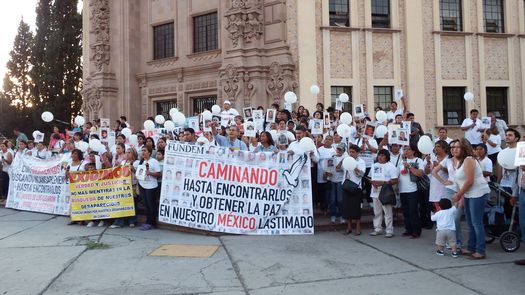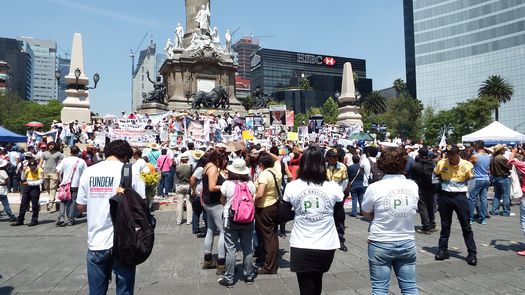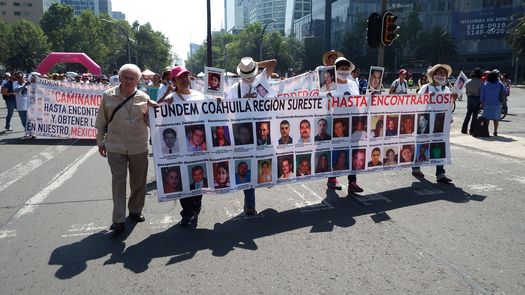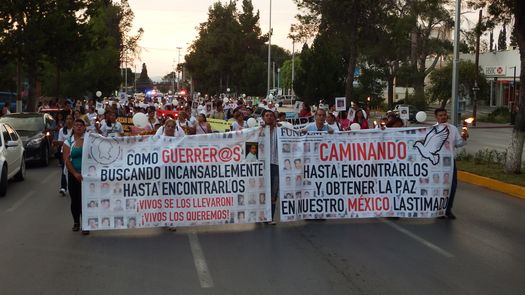Mexico City, 9 October 2015.– Between May and December 2015, PBI Mexico will publish a series of interviews with Human Rights Defenders which we accompany or with whom we maintain a close relationship. This month we present an interview with Silvia Rodriguez and Raul Reyes, members of United Forces for Our Disappeared Persons in Coahuila (FUUNDEC), and both of them searching for their children. A group of relatives of disappeared persons came together and formed FUUNDEC in December 2009, and through the work of the group they demand for all the missing persons' cases to be investigated and that these persons are located: "Our claim has to be for every missing person, not just for my loved one." FUUNDEC is advised by the Fray Juan de Larios Diocesan Centre for Human Rights (CDDHFJDL), an organisation that is accompanied by PBI.
Photo: Families of FUUNDEC, during demonstration in Saltillo © PBI Mexico
Silvia Rodriguez, mother of Claudia Rizada
“My name is Silvia Rodriguez Ibarra. I am from Saltillo and I am here because I'm searching for my daughter who is missing. Her name is Claudia Rizada Rodriguez.
Defending human rights for me is a new thing. I had heard about the people who deal with human rights. But I did not believe they would help us in the search for our missing loved ones. Now I can say the human rights people have helped us a lot. If they were not here, we would be sicker; we would be consumed. I would like to learn, to learn to defend our rights. My request is to search for and to find the people who are missing.
Whenever there is news that another person disappears, I feel it. It is as if the problem were happening to me. I wish that disappearances would not happen anymore, but actually they continue happening day after day. Before this happened to my daughter I did not think much about disappearances. I saw them from far away as something I would never go through. And today I see that it is very common and that these things happen very often. I think that the authorities have not done much to look for them, because no one knows anything. Not one person has appeared. Not one of the missing persons that we are looking for [in FUUNDEC] has been located.
Now I belong to the organisation FUUNDEC. One time I met Blanquita and Alma [Blanca Martínez and Alma Gomez from CDDHFJDL] in the attorney’s office. They told me about this organisation of relatives and I started to attend their meetings.
I am alone looking for my daughter; I’m the only one looking for her. I have a local “tortillas” shop. This is the work I do.”
The disappearance of Claudia Rodriguez Rizada
“My daughter disappeared on June 28, 2011. She was 26. She went out for dinner with her boyfriend and neither of them returned. I went with the boy's mother to their workplace and we were told that neither of them had gone to work after that night. We tried to file a missing person's report with the state but they did not want to take it. We were told that maybe they had gone on vacations. The next day we returned to that office. They asked us many questions and wrote down some information but they would not let us register the report. They let another day pass. The following day I told them 'my daughter is not one of those people who just leave. She has a child and she always wants to know how he is. Many days have gone by since she went missing'. Then they took my statement. But since then until now I have not heard anything from my daughter. They found her boyfriend's documentation in the car of some criminals, but they haven´t found anything of my daughter’s.
The hope of finding her is the only thing that keeps me going, this and having to care for her child. I have taken responsibility of him. It is a commitment that I have with the child. The child has his father and he sees him, but he doesn’t live with him.
Sometimes I have collapsed. I have been sick because I'm alone in this search. It is very hard, especially when the child asks about his mother. My husband has developed a blood-sugar problem. Sometimes we are very distant to one another and other times we are united. My husband's family has taken distance from us. I think they are afraid. My daughters tell me not to give up, that one day she will return, that I should not lose hope.
The child has lost his health insurance because his mother is no longer working. I was told that the child was no longer entitled to health care. I said: 'his mom is missing; it is not fair to remove his health care'. But they did not accept my argument. I also worry because I do not want to lose my daughter's house. I have not been able to pay the monthly rates, because it is a lot of money. But I have to fight to save the house, otherwise what is the child going to have? They took everything from him. The child has been left helpless. He has nothing.”
Photo: FUUNDEC families in Mexico City during the Mother's Day Demonstration © PBI Mexico
Raul Reyes, the father of Raul Ignacio
“My name is Raul Reyes. I'm looking for my son Raul Ignacio Reyes Zepeda who disappeared in 2009. I demand the appearance of my son and of all missing persons and that the authorities get to work.
We are human rights defenders because we are with the group FUUNDEC. When we go to the group meetings, we speak for the group, for all the missing, not just for our personal cases. We got to know FUUNDEC when we went to the church in our neighbourhood and the priest informed us that there was a group of people who have missing family members who had formed a group to help each other out. Right now we are about 230 families. The group has helped us a lot psychologically. We appreciate the cooperation and the help and support that the Centre Fray Juan de Larios offers with their counselling.
To the people from other countries, I ask them to see if they could help, not in the search, but in advising us, or that an authority there gets in contact with an authority here in order to ensure that they do an efficient job.”
The disappearance of Raul Reyes Ignacio Zepeda
My son worked for a transport company and supplied materials for trucks that had broken down anywhere throughout Mexico. He provided replacement for the mechanical parts. It was in Easter, April 2009, when we were on vacation and upon our return we saw that he was not here. Due to his work, he was out constantly and sometimes for a period of time so this did not surprise us. After a month, we saw that he had not returned. We presented a complaint but the authorities did not take the problem seriously. We were told that maybe he had gone as "wetback" [crossed to the USA]. At that time, the authorities were covering up the problem, and there was not much information about what was going on. After two months, the authorities told us that our son was part of a group of eleven missing persons – another authority said there were 24 people. It seems that one of these missing persons phoned from a ranch in Piedras Negras. And I figure that if we were told that my son was in that group, they must have knowledge of something, but they did not give me any more information.
I understand that the authorities have not worked with a problem like this and many do not know how to approach it. But many years have gone by and still nothing has happened.
We in the family believe that maybe the organised crime took him and perhaps forced him to join their ranks. Among the missing, there are many educated people. There are good drivers, engineers, people who handle communications people and so forth. There are also many working people, mechanics, construction workers, civil engineers, people whose knowledge could be useful for the needs of organised crime. It is believed that they use them for designing and making tunnels, or their laboratories.”
Photo: FUUNDEC families in Mexico City during the Mother's Day Demonstration © PBI Mexico
The consequences of the disappearances for the relatives
“People do not report disappearances because they are afraid. They fear the organised crime groups. There are cases where they directly enter family homes and take everyone out. If you speak, consequences will follow, you disappear or your entire family disappears. Thank God nothing has ever happened to us due to our complaint.
When this happened I was already retired. I was not working. I tried to look for work but due to my age, nobody offered me anything. Then we opened a small tailoring shop. I have a little shop selling and processing woven garments. I spend most of the day there weaving. It frees me from many evil thoughts, gives me strength and helps me cope with the loneliness.
The disappearance of our son has caused many frictions between my wife and me. We are not one hundred percent with each other. My wife is more impacted than I am and she needs a lot of support. We have another daughter. Repeatedly she tells me to stop searching, that I should stop looking for him, because her brother is already dead.
My son had a family with a lady, and we usually see the child every month. Right now he is 9 and says: 'My daddy, why doesn’t he come home? Where is he? Maybe he is in the United States and already has another family. If he's dead, where is he? I want to see him, to bring him flowers.' We say to him: 'my child, you see us spending time in meetings on Sundays because your daddy is missing. We do not know if he's dead, but he is missing'.”
The right to hope
Blanca Martinez from the Fray Juan de Larios Diocesan Centre for Human Rights mentions that: "for FUUNDEC and for us in Fray Juan de Larios, justice means finding the missing ones. Later comes everything else; punishment of those responsible, reparations, guarantees of non-repetition. We believe that there may still be many people alive and we remain committed to finding them. For a family who finds a missing loved one, living or dead, is to find life. We will not allow for the missing to be handled as dead while that is not yet known. That is an international human rights principle and a right of the families: that their hope is respected."
Photo: Families of FUUNDEC, during demonstration in Saltillo © PBI Mexico
* This interview was conducted by Susana Nistal and translated by Annie Hintz




